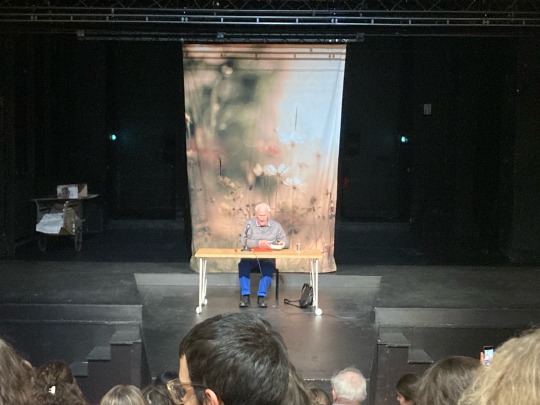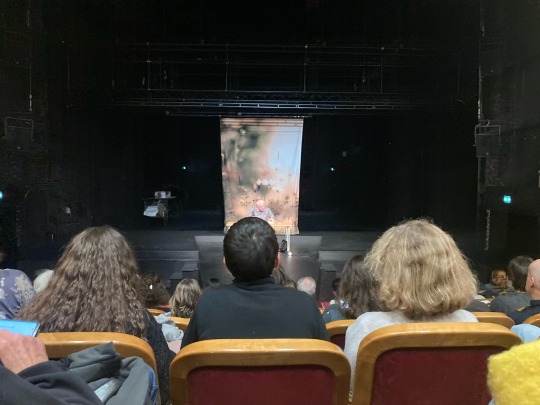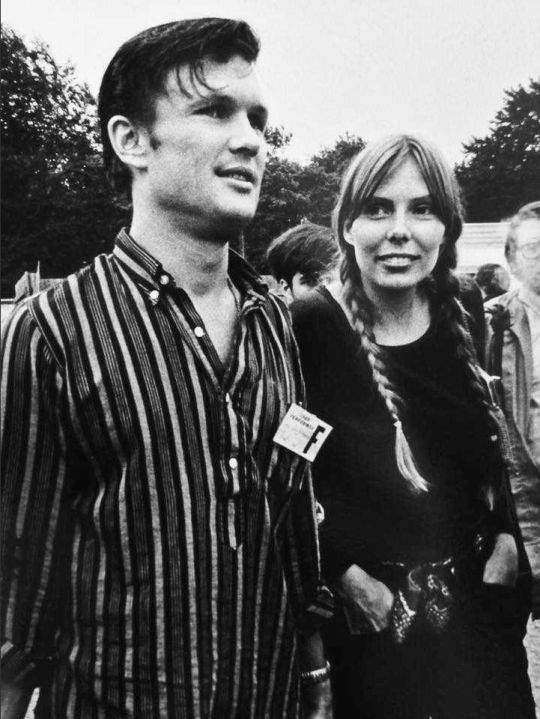#Badiou
Text

Philip Larkin, from "Be my Valentine this Monday", The Complete Poems [ID in ALT]
#q#lit#quotes#poetry#literature#philip larkin#be my valentine this monday#the complete poems of philip larkin#forever favourite#badiou#m#reading#x
2K notes
·
View notes
Text
“Yes, lovers are alone in the world, alone in expressing the world in terms of the Two that they are. But this solitary work has a universal value, opening difference to infinity as an immanent blessing.”
The Immanence of Truths
18 notes
·
View notes
Quote
I sometimes think that if love didn’t exist, what would people talk about otherwise? Love is one of the strongest subjective feelings that exists. Everyone’s always known that - it's why in books, in plays and tragedies, you have love as the driving force. You must take an interest in all that appears as the great passions of humanity - which means the big commitments of human subjects which, for whatever reason, go beyond man’s immediate concerns. It’s in these great passions that mankind creates its future, and it’s there that it can get out of its present state and create something new. So, it’s something that deserves to ask that simple question: where are we today with this question of love?
Today, it’s necessary to defend love.
Love is the most powerful way known to humanity to have an intimate relationship with another. It places you in a state of dependence on another. Which is something that is fundamentally against modern individualism. If the sole motivation for human action is to satisfy one’s wishes and interests, which is after all the dominant idea of the modern world. If that is humanity, then love can indeed be seen as a danger.
We should be wary of love, and in particular, what happens on dating sites, where we try to guarantee a romantic encounter in advance by ensuring that anyone you meet is just like you; they have the same tastes, the same wishes and the same determination. I think that goes against the very definition of love. Because it means there’s no element of adventure, no risks are taken - mutual satisfaction has to be guaranteed, like some kind of business contract - and that I think is a serious threat to love.
You need to defend love as a real, risky adventure against this individualistic, even egotistical vision. Because the truth is that love can’t be reduced to individualistic egoism.
Love is, in a way, a lesson in courage.
In arranged marriages there is no risk. The same with dating sites. You try to avoid risk. Avoiding risk by calculating how to maximise a relationship with another. I think that all creation, all truth with any real significance, is always linked to an event. Anything else is just a normal consequence of the everyday world. It’s neither a creation nor an invention, just a continuation. What does it mean to start something? If you want to consider something beginning, you have to consider there is an element of chance. If there isn’t chance involved, then it’s not a start because it’s something that already exists and is pre-determined. So when I focus on risk, I focus on the fact that love, as a creation, as an invention, is closely linked to a meeting. A meeting which is risky. And can be a meeting with people from completely different worlds. It’s precisely because of the role that chance plays that love can have a creative dimension that is really interesting and universal.
True love, intense love, makes possible what was previously impossible.
The modern individualist world is a world which presents humanity as a collection of single entities. Each is 'one'. In its purest sense love is this passage from one to two in the experience of life itself. Love creates a perspective and an existence in the world which is not from the point of view of 'one' because it is the perspective of 'two'. The passing from one to two is a revolution. A great revolution.
It’s as if we are putting things in perspective, as if suddenly the world has an extra dimension. And it’s an absolutely fundamental experience because it shows us, makes us realise, that the truth of the world is in fact sustained by the multitudes, not by the atom that is you personally.
Many people give up love. People don’t understand clearly enough that love is a creation. A modern tendency, when there’s an obstacle is to let go and move on to something else. If we settle on the idea that as soon as something is hard we have to give it up, we will settle for an uninteresting life. I don’t deny the existence of love’s sadness. Abandonment or disappointment can be terrible emotions. But if, because of this pain, you renounce love, then you reject the greatest experience of another that you can have in your existence.
'All that is true is rare and difficult'
Unfortunately, that is true.
French philosopher Alain Badiou on love
85 notes
·
View notes
Text
"Truth, for Badiou, is never simply a revelation, but has reality only in and through the subject who changes the world in its name. If the subject “answers the call,” then it and the event become part of what Badiou calls “truth procedures,” of which he recognizes four: politics, where a status quo is breached in the name of a new community or society, science, in the name of new possibilities of knowing, art, of a new language of forms and love, a newly shared world of Two instead of One."
Ype de Boer (In 'Badiou and Agamben Beyond the Happiness Industry and its Critics')
8 notes
·
View notes
Text
“Thanks to grave crises, false promises, and inappropriate “solutions,” governments create among their people, on a large scale, frustration, misunderstanding, anxiety, and vague revolts... In today’s world, the exercise of politics is about these tiny differences, all inside the same global orientation.” – Alain Badiou, Trump
6 notes
·
View notes
Text
In love, fidelity signifies this extended victory: the randomness of an encounter defeated day after day through the invention of what will endure, through the birth of a world.
Alain Badiou, In Praise of Love
#have been reading sections for badiou lately in anthro#his framework for understanding love and desire only continues to consume my thoughts#alain badiou#badiou#philosophy of love
3 notes
·
View notes
Text
We live in a contradiction, a brutal state of affairs, profoundly inegalitarian – where all existence is evaluated in terms of money alone – is presented to us as ideal. To justify their conservatism, the partisans of the established order cannot really call it ideal or wonderful. So instead, they have decided to say that all the rest is horrible.
Sure, they say, we may not live in a condition of perfect Goodness. But we’re lucky that we don’t live in a condition of Evil. Our democracy is not perfect. But it’s better than the bloody dictatorships. Capitalism is unjust. But it’s not criminal like Stalinism. We let millions of Africans die of AIDS, but we don’t make racist nationalist declarations like Milosevic. We kill Iraqis with our airplanes, but we don’t cut their throats with machetes like they do in Rwanda, etc..
Alain Badiou, in interview, 2001
16 notes
·
View notes
Text

Alain Badiou, "The Immanence of Truths."
3 notes
·
View notes
Text
Parmenidean Dualisms as Schemas 'L' (What is “What” in Being and Event?)
Here is the first paragraph of “Meditation 1. The One and the Multiple: A Priori Conditions of any Possible Ontology” from Alain Badiou’s Being and Event (pg. 25):
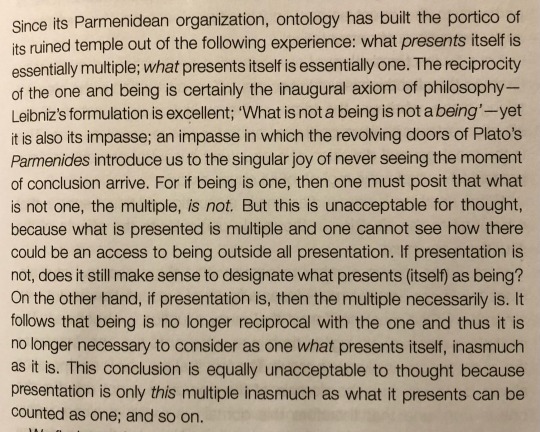
Lengthy excerpt of the online entry, “Parmenides”, from Stanford Encyclopedia of Philosophy (written by John Palmer):
“Immediately after welcoming Parmenides to her abode, the goddess describes as follows the content of the revelation he is about to receive:

"This programmatic announcement already indicates that the goddess’ revelation will come in two major phases. The goddess provides some further instruction and admonition before commencing the first phase, the demonstration of the nature of what she here mysteriously calls “the unshaken heart of well-rounded reality” (fr. 1.29). She then follows this first phase of her revelation with what in the originally complete poem was a much longer account of the principles, origins, and operation of the cosmos and its constituents, from the heavens and the sun, moon, and stars right down to the earth and its population of living creatures, including humans themselves. This second phase, a cosmological account in the traditional Presocratic mold, is what she here refers to as “the notions of mortals, in which there is no genuine trustworthiness” (fr. 1.30).
"The governing motif of the goddess’ revelation is that of the “ways of inquiry.” In the all-important fragment 2, she specifies two such ways:

"The second way of inquiry is here set aside virtually as soon as it is introduced. The goddess goes on to refer back to the first way of inquiry and then speaks of another way as characteristic of mortal inquiry:
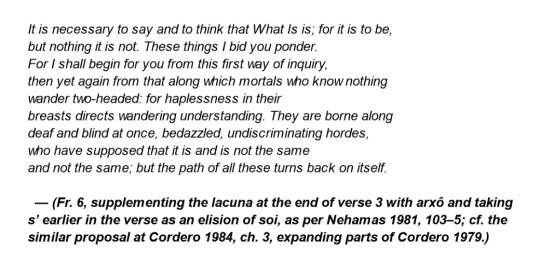
"Here the goddess again articulates the division of her revelation into the two major phases first announced at the end of fragment 1. Compare her subsequent pronouncement at the point of transition from the first phase’s account of reality to the second phase’s cosmology: “At this point I cease for you the trustworthy account and meditation/ regarding true reality; from this point on mortal notions/ learn, listening to the deceptive order of my verses” (fr. 8.50–2).
"Clearly, the goddess’ account of “true reality” proceeds along the first way of inquiry introduced in fragment 2. Some have thought the cosmology proceeds along the second way of inquiry introduced at fr. 2.5, on the ground that the two ways introduced in fragment 2 appear to be presented as the only conceivable ways of inquiry. However, the way presented in fragment 6, as that along which wanders the thought of mortals “who have supposed that it is and is not the same and not the same” (fr. 6.7–8a), involves an intermingling of being and not-being altogether different from what one sees in the way of inquiry earlier specified as “that [it] is not and that [it] must not be” (fr. 2.5). Fragment 6 thus appears to be introducing a third and different way, one not to be identified with fragment 2’s second way, which has already been set aside. The same mixture of being and non-being likewise features in the goddess’ warning to Parmenides in fragment 7 not to allow his thought to proceed along the way typical of mortal inquiries: “…for this may never be made manageable, that things that are not are./ But you from this way of inquiry restrain your understanding,/ and do not let habit born of much experience force you along this way,/ to employ aimless sight and echoing hearing/ and tongue. But judge by reason the strife-filled critique/ I have delivered” (fr. 7).”
— source: https://plato.stanford.edu/cgi-bin/encyclopedia/archinfo.cgi?entry=parmenides
Presentation versus Representation: What is “What”?
Badiou states in his meditation: “…what presents itself is essentially multiple; what presents itself is essentially one.” For the emergence of “representation” as it occurs in accordance with knowledge of the unconscious, which I have tried in previous writings to imagine as something produced by the mechanisms of a Laplanchian “engine”, an interface of both (Parmenidean) Day and Night and their interactions with knowledge becomes apparent. Consequently, two identical schemas L are in contact with one another for the purposes of such a production of knowledge, but one of them has its colors symbolically inverted. What this is intended to communicate and help to illustrate is the covering-up of ontic presentation (“What Is”) by psychical representation (an existential relation to symbolism).

This inversion [of color] itself is fundamentally one that is grammatical (i.e, pertaining to perceptual “grammar”), specifically as the characteristic valence between the two poles of “what presents” and “what presents” found in ontological thinking, whereas presentation itself is something fundamentally essential (i.e, pertaining to “essence”) to being, and incontrovertibly internal to existence. (I think of the abstract concept of “existence” as a state-of-being always entailing some form of outward expression which belongs to a particular thing, if that helps).
As a monistic conception of What Is permits itself, by its very own rationale, to begin to cut itself up into standardized pieces, or units, presentations of such outward expressions which characterize any given perceptible thing’s proper existence multiply in response to their originary monad. This is both a crucial and highly ancient enigma of ontological study and observation, one which still poses challenges to contemporary physical, mechanical, and chemical methods of understanding and knowing about real matter that inhabits the universe. This unfolding of presentations to our senses depends on their intrinsic sensibility, and thus provides our cognition with scientific grounds for believing in the idea of certainty. For a useful frame of reference to German Idealism, one may say that the Prussian philosopher Immanuel Kant referred to this process (of the “unfolding” of presentations of real existence) as the “Transcendental Aesthetic” in his 1781 book titled in German Kritik der reinen Vernunft, or in English, “Critique of Pure Reason”.
Such a multiplicity of presentations, brought into relation to one another via their grammatical (inter-)predication, in my view may be called “representations”. This ratification of “representation” over presentation depends, however, on our individual and consciously-motivated interpretations of perception in turn.
What is the relation of representation to interpretation, then? Firstly, the answer proceeds from the fact that representation is very, very interesting. “Interesting” is an English word derived from Latin words, inter and est, meaning “between” and “is”. Therefore, what is called “interesting” ought to be considered properly as something involving a kind of recognizable being between: namely, something of my own personal being is at stake in the consideration of the object, which in English becomes the predicate of any articulated adjective. Without this object that I am actively thinking [of], a part of my existence would go absolutely missing, and this in accordance with the objective utterance of the sentence.
Secondly, regard how interpretation is “the appropriation of the understanding”, as Immanuel Kant would have it. So, what does the goddess of Parmenides’ “proem” say about “just which ways of inquiry alone there are for understanding”? She asserts that there is a “path of conviction” which underlies a genuine understanding of “true reality”, in other words, the idea that “What Is is”, or, the “one that it is, and it is not not to be”, and another way of inquiry, that “it is not and it must not be”, which is a “path wholly without report”.
Paradoxically, what Badiou in the above excerpt calls ontology’s “ruined temple” cannot be re-imagined or brought to mind without the proem of Parmenides setting the revelations of the goddess as revelations which are derived from an irreducible Night, even though “true reality”, or the concrete content of knowable knowledge, is something which emerges by means of the light of Day, and not within the cosmological confines of Night, which personifies the inner space of the aforementioned “ruined temple”. What must be brought into connection with this temple of Night perhaps is the famous quote from Hegel, stating that “the owl of Minerva takes flight only at the coming of dusk”, as well as what Jacques Lacan elaborates on in his seventeenth seminar of the year 1968-1969, “L’Envers de la psychanalyse” (“The Other Side of Psychoanalysis”, which of course corresponds to an analogous Moebius strip) as the difference which is established between the day and the night, and how this occurrence bears for us the source of originary signifying phenomena, especially within the discrepancy observed between an utterance (énonciation) and a statement (énoncé).
CORRECTION: I was actually thinking of Jacques Lacan speaking about the "peace of the evening" in the third year of his seminar, titled "The Psychoses" (pp. 138-139):
“I don’t want to give an overly philosophical discourse here but want to show you for example what I mean when I tell you that discourse is essentially directed at something for which we have no other term than being.
“ I ask you, then, to think about this for a moment. You were at the close of a stormy and tiring day, you were guard the darkness that is beginning to fall upon your surroundings, and something comes to mind, embodied in the expression, the peace of the evening.
“I don’t think anybody who has a normal affective life is unaware that this is something that exists and has a completely different value from the phenomenal apprehension of the close of the clamor of the day, of an attenuation of contours and passions. There is in the peace of the evening both a presence and a choice from everything that surrounds you.
“What link is there between the expression the peace of the evening and what you experience? It’s not absurd to ask oneself whether beings who didn’t give this peace of the evening a distinct existence, who didn’t formulate it verbally, could distinguish it from any of the other registers under which temporal reality may be apprehended. This might be a panic feeling, for example, over the presence of the world, an agitation that you observe at that moment in the behavior of your cat which appears to be searching left and right for the presence of a ghost, or this anxiety which, although unknown to us, we attribute to primitive peoples over the setting of the sun, when we think they are perhaps afraid that the sun will not return – which, moreover, isn’t unthinkable. In short, a feeling of disquiet, of a quest. There’s something here – isn’t there? – that leaves intact the question of what the relationship is between this order of being, which has its existence equivalent to all sorts of other existences in our lived experience, and which is called the peace of the evening, and its verbal expression.
“We can now observe that something quite different happens according to whether we, who have called up this peace of the evening ourselves, have formulated this expression before uttering it, or whether it takes us by surprise or interrupts us, calming the movement of agitation that dwelled within us. It’s precisely when we are not listening for it, when it’s outside our field and suddenly hits us from behind, that it assumes its full value, surprised as we are by this more or less endophasic, more or less inspired, expression that comes to us like a murmur from without, a manifestation of discourse insofar as it barely belongs to us, which comes as an echo of what it is that is all of a sudden significant for us in this presence, and utterance such that we don’t know whether it comes from without or from within – the peace of the evening.
“ Without going to the heart of the issue of the relationship between the signifier, qua, signifier of language, and something that, without it would never be named, it’s noticeable that the last week’s press it, the less we speak, the more it speaks to us. The more for, and we are to what is that issue in this being, the more it has a tendency to present itself to us, accompanied by this pacifying expression that presents itself as indeterminate, lying on the border between the field of our motor autonomy and there’s something that is said to us from outside, this something through which the world borders on speaking to us.
“What does this being, or not, of language, this the peace of the evening, mean? To the extent that were not expecting it, or wishing for it, or haven’t even thought about it for a long time, it’s essentially as a signifier, that it presents itself to us. No experimentalist construction can justify its existence, there is a dead I’m here, a certain way to take this time of the evening as a signifier, and we can be open to it or close to it. And it’s precisely insofar as we have been close to it, that we receive it through this peculiar echo phenomenon, or at least the start of it, which consists in the appearance, at the limit of the phenomenon’s grip on us, of what will most commonly be expressed for us, by these words, the peace of the evening. We have now come to the limit at which discourse, if it opens onto anything beyond meaning, opens onto the signifier in the real. We shall never know, in the perfect ambiguity in which it dwells, what it owes to this marriage with discourse.
“You can see how the more the signifier takes us by surprise, that is, in principle escapes us, the more it’s already presented to us with a more or less appropriate fringe of discourse phenomena. Well then, the issue for us – this is the working hypothesis I propose – is to look for what there is at the center of President Schreber’s experience, what he senses without knowing it, at the edge of the field of his experience, at the fringe, carried away, as he is in the froth created by the signifier he fails to perceive as one, but which, at its limit organizes all these phenomena.”
Additionally, the aforementioned quote from Hegel is explained quite well by Thomas Pogge on askphilosophers.org:
“The meaning of Hegel's saying is that philosophy/wisdom takes flight only at the end of the day, after the day's main events have taken place. For Hegel, this was not tragic. His particular point is that it is only at the end of human history (which he associated with his own time, the early 19th century) that human beings can come to understand history's developmental logic. In fact, our coming to understand history is part of this developmental logic; and once we fully understand we are reconciled to history and thus would not have wanted history to have gone differently in any important respect.” — source: https://www.askphilosophers.org/question/1579
So: how is "what" functioning in relation to presentation? The answer to the question (what is “what”?) might be that it (“what”) is, in a singular word, the invention of the grammatical past tense. Consider what Badiou states about one and multiple:
“For if being is one, then one must posit that what is not one, the multiple, is not. But this is unacceptable for thought, because what is presented is multiple and one cannot see how there could be an access to being outside all presentation. If presentation is not, does it still make sense to designate what presents (itself) as being?” (Being and Event, p. 25, emphasis in bold my own)
Therefore, the mechanisms of logical thought require and subsequently demand from the subject (“S” on schema L) a reconciliation between [a.] the self-cutting-up of existence into many different cognizable units, and [b.] re-circuiting of these units in relation to one another as parts of both being and understanding in the mode of their grammatical genesis. The complicated intersections of logic and thought which occur between “[a.]” and “[b.]” here are described by Hegel in his doctrine of the Notion beginning at "A. The Subjective Notion" (§163, Hegel's Logic, p. 226) describing the different kinds of possible judgements , and from there it is expounded throughout the rest of that doctrine into a comprehensive account of thought itself as something which, in my view, navigates the gaps between Being and Essence as an agency that is simultaneously both grammatical and ontological (in the shape of what Hegel called Geist, or in English, “Mind” or “Spirit”).
Alain Badiou continues to state:
“If presentation is not, does it still make sense to designate what presents (itself) as being? On the other hand, if presentation is, then the multiple necessarily is. It follows that being is no longer reciprocal with the one and thus it is no longer necessary to consider as one what presents itself, inasmuch as it is. This conclusion is equally unacceptable to thought because presentation is only this multiple inasmuch as what it presents can be counted as one; and so on.” (ibid., emphasis in bold my own)
Here in this quote we encounter an exegetical and semantic mirror-image (or “mirror-writing”?) of what the goddess reveals to the speaker in Parmenides’ poem in the form of the two seemingly contradictory dichotomizations of the understanding of “true reality”. This is a division which happens in the dialogue initially into a primacy of a certain duality, one taking place between, first of all, “the unshaken heart of well-rounded reality” (i.e, the mechanical and physical foundations of the cosmos as the primordial backdrop of our geocentric conceptions of life and thought), and secondly, “the notions of mortals, in which there is no genuine trustworthiness” (i.e, the flawed, human, geocentric conceptions of life and thought). The auxiliary duality, that of the “ways of inquiry” described by the goddess to the speaker of Parmenides’ epic poem, then begins to be directly mirrored in the above quote from Being and Event where it says: “It follows that being is no longer reciprocal with the one…”
I have illustrated the exegetical idea of this “mirror-writing” found in Badiou’s text in relation to Parmenides’ poem using the following visual aid:

What the excerpts in the two right quadrants of this visual aid mean in relation to Hegel’s philosophy is less definite than simply pointing towards what begins in Hegel’s “Doctrine of Notion” with his written sections about different kinds of judgements and syllogisms. In fact, with the direction Hegel takes in this “doctrine” toward an explanation of the very logic (or animating thought) possessed by molecular matter and its very own real existence, it comes off as though Hegel too is an epic poet like Parmenides, one who is steadily becoming, by way of his own miraculous explanations of philosophy, the same omniscient goddess of the mythical temple where both Day and Night perennially take turns staying. But the displacement of knowledge, always thrown into chaotic motion and discord by the concept of the multiple, is what is undermined by the impasse to Hegelian philosophy which Alain Badiou places a description of in the last sentence of the first paragraph of “Meditation 1” in Being and Event. The multiple is like a rock that philosophy is forever doomed to somehow trip over, or like the hand of Jacob/Israel, which in the Book of Genesis grasped his brother Esau’s heel in utero.
Furthermore, just as there are the four algebraic letters which rotate counterclockwise in the transitions that occur from one discourse to the next (as they are found to do in Jacques Lacan’s four discourses), then, for Badiou it appears that there are also four indispensable terms endlessly revolving around a mysterious, empty center: being, one, presentation, and multiple. Hegelian philosophy would like to treat this fourth term as something other than “multiple”: e.g. “knowledge”, “understanding”, “representation”, “mind”. But these are mere signifieds of the multiple, viz. objects of abstract conception with no easily or readily identifiable existence.I have made an image (originally taken from nosubject.com, source: https://nosubject.com/Four_Discourses) in order to illustrate what I mean about Badiou’s meditation, and the consequences it possibly carries for the interpretation of Lacan’s theory of the four discourses (especially as it might regard Alain Badiou’s astonishingly well-enacted critique of Hegelian philosophy):
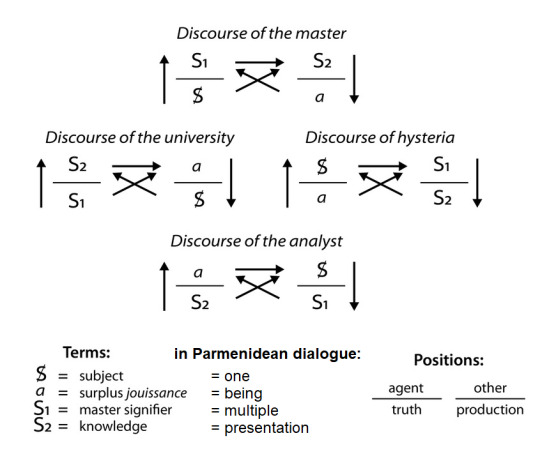
And so, the conceptual starting-point (like the value of “t-zero” in physics, perhaps) of Being and Event is not only to deploy a mirror-writing of what survives of Parmenides’ epic poem of ancient philosophical exposition (which, in honesty, is a relatively recent work from an anthropological point-of-view), but also to take a stab at what seems to be something like Hegel’s wooden peg-leg, an impotent extension of his philosophy (determinism of the multiple) which supports only the ongoing, self-assigned destiny of its own self-completion via the relative passage of time through writing and text. In other words, the predetermined or pre-decided multiple is the encyclopedia of philosophical science’s textual self-unfolding. But where can we find, within Hegel’s supposedly unitary book, an awareness or recognition of the fact that time still goes on after the writing, printing, reading, and understanding of such an entire book is finished (Logic, Nature, and Mind), and that this temporal ongoingness of mental experience presumably always incurs a historical effect in excess of any hypothesized “end of history”?
I am saying that last sentence/question for rhetorical effect, but I also hope there might be an interesting answer. Hegel, following these above proposed terms of Parmenidean dialogue in my reading of Being and Event, is sempiternally acting out the discourse of hysteria by making knowledge into a perpetual object of production, or a fixed multiple, which falls back inherently on what he himself describes as the “analytical method” in his Logic, in contradistinction to the “synthetic method”. Perhaps this fixed multiple is simply a mode of knowing, then, which Hegel philosophically discovered himself, since it is (and was) something that arose in respect to definitive historical events (the French Revolution, Napoleonic Wars) that were taking place in western and central Europe during Hegel’s lifetime. Then again, is Hegel actually espousing the discourse of hysteria by writing it and thereby embodying it in the form of the literal textbook, or does this wordless, mechanistic “discourse” more accurately animate his writing, breathe life into it, and drive it towards its characteristic and fully-comprehensive exposition of philosophical concepts in the shape of what he founded as Absolute Knowing?
In any case, the compounding of all these different meanderings about Hegel’s philosophy and Lacan’s four discourses directly deals with the issue of the temporal and philosophical status of the what.
In the Parmenidean dialogue, the idea of truth is converged upon in an asymptotic, temporal way. Thus, there is something a bit more deeply primordial going on with Parmenides’ epic poem than with Hegel’s written philosophy, albeit Hegel assumes far more safely and accurately that he can put his philosophical faith into ongoing political formations towards the notion of Absolute Knowing, since these are already fomented by historical events and occurrences. However, the terms of production for the four discourses of Jacques Lacan as they can be made to deal with the Parmenidean dialogue of the epic poem can be re-identified according to a more chaotic notion of truth.
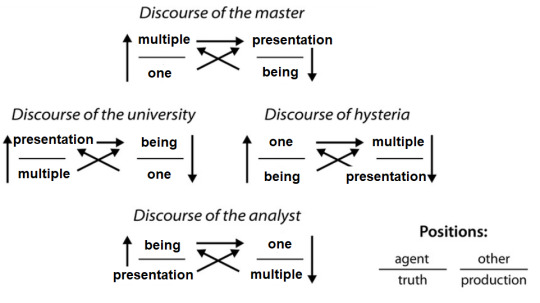
The two major dualities that are discussed in the article “Parmenides” from the Stanford Encyclopedia of Philosophy as part of the goddess’s exposition of the world are re-rendered below in accordance with the re-defining of the traditional terms of the four discourses, as they are expressed in Lacanian algebra, into terms that Badiou uses in his “Meditation 1”. Then the two major dualities which are dichotomized (1. and 2.) are described by their discursive sequences.
First major Parmenidean duality (1. well-rounded reality/2. notions of mortals) [astronomy/geology]
Dichotomy (1 → 2 = Night → Day):
university (one) → hysteria (presentation)
master (being) → analyst (multiple)
Second major Parmenidean duality (1. path of conviction/2. path without report) [paranoia/nothingness]
Dichotomy (1 → 2 = Day → Night):
hysteria (presentation) → university (one)
analyst (multiple) → master (being)
The above graphic which illustrates the Parmenidean Day and Night using the two schemas L is basically an illustration of these dichotomies at work within their mythic register. The first duality contains the transition from Night to Day. The second duality contains the transition from Day to Night. The “what” of presentation is opened up by the necessity for the grammatical past tense in response to the Parmenidean cosmology which forms the unconscious backdrop for the very primordial (and basically very infantile) experience of uncertainty. To feel uncertain is fundamental to the all-important notions of knowledge and knowing in response to temporal existence: this is one of the main rhetorical mechanisms which Alain Badiou puts to use at the start of Being and Event, perhaps because uncertainty in relation to the one functions as an evasive maneuver around Hegelian philosophy, responds in kind to the ontological gray areas of Lacanian psychoanalysis, addresses the Platonic origin story of the Western (European) philosophical tradition, and locates its most essential moment of capitulation in the poetry of Parmenides.
— (11/12/2022)
#alain badiou#badiou#being and event#parmenides#plato#lacanian psychoanalysis#immanuel kant#kant#hegel#georg wilhelm friedrich hegel#ontology#epistemology#ancient greek philosophy
2 notes
·
View notes
Text
“Like all true nostalgia, this nostalgia amounts to wistfully longing for a state of affairs that never was. Nostalgia constructs its object, which it adorns with the real virtues of an imaginary past.”
Images of the Present Time
9 notes
·
View notes
Text
"Le théâtre, c'est le collectif, c'est la forme esthétique de la fraternité. C'est pour ça que je soutiendrai qu'il y a quelque chose de communiste dans tout théâtre, en ce sens-là. J'entends ici par « communiste » tout devenir qui fait prévaloir l'en-commun sur l'égoïsme, l'œuvre collective sur l'intérêt privé. Soit dit en passant, l'amour est communiste en ce sens, si l'on admet, comme moi, que le vrai sujet d'un amour est le devenir du couple et non la satisfaction des individus qui le composent. Encore une définition possible de l'amour : le communisme minimum!"
Alain Badiou, Éloge de l'amour
1 note
·
View note
Text

"Conviction in love and politics, something one must never renounce. That was really the moment when, in between politics and love, my life found the musical chord that ensured its harmony." (Badiou)
[still from Virata Parvam]
2 notes
·
View notes
Text
« Shem » et « Shemen », ou : Quatre discours sur l’Un
“Shem et shemen” ©Philippe Quéau 2023 ©Art Κέω 2023
Sur la question de l’Un, on trouve de par le monde, à travers les époques, de bien multiples opinions. L’Un, apparemment, ne se laisse pas dire tout uniment, ni saisir de façon univoque. Contradiction ? Ou bien incitation à la recherche ? Il y a quelque chose de stimulant à observer la tension entre ce que l’idée de l’Un, en tant que telle, et…
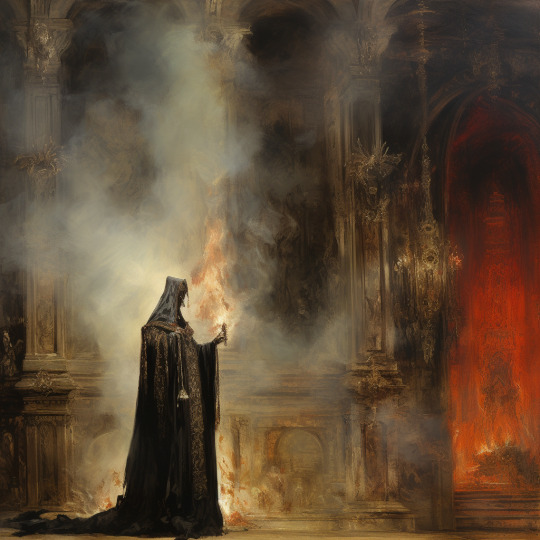
View On WordPress
0 notes
Text
badiou is like the inverse of every other philosopher re: comparison between politics/philosophy. like most of the time you get people being like "my thought is a radical subversion of the normative dimensions of xyz" and then it cashes out as social democracy meanwhile badiou is like "we must restore platonist-pauline universalism with mathematics" which seems prima facie conservative but he's like a lifelong diehard maoist.
#idk i don't know a lot abt badiou or anything#just thinking about it apropos of reading zizek again
43 notes
·
View notes

